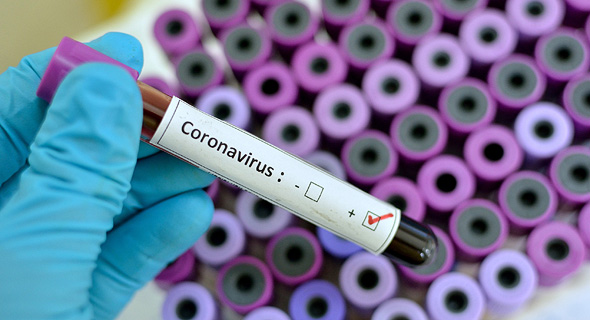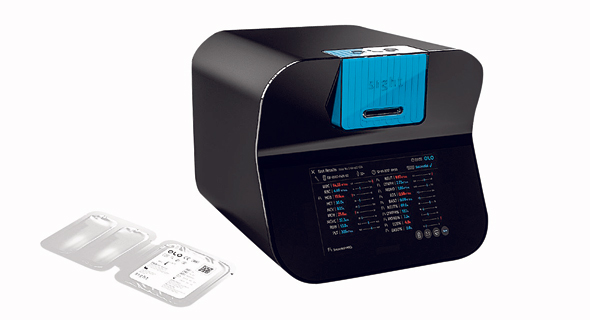The Israeli Inventions That Lessen The Healthcare System’s Burden
Israeli innovation has been enlisted in the battle against Covid-19. Here are six technological inventions helping health personnel in their fight against the pandemic
10:2623.03.20
The coronavirus (Covid-19) pandemic has shed an unflattering light on the faults of the global healthcare systems, from China to Italy, and posed a myriad of new challenges to both healthcare professionals and researchers. Governments, including that of Israel, have called on tech companies to enlist in the battle against the outbreak. In reality, many medtech and biotech companies have already started working to alter their technologies accordingly.
In Israel, both industry veterans and young startups have jumped into the fray, allocating resources and manpower in an effort to find new solutions that could ease the strain on the overburdened healthcare system. Calcalist has taken a closer look at some of the most prominent ones.

Coronavirus test (illustration). Photo: Getty Imagesצילום: גטי אימג'ס
Discover the virus in seconds: the AI that identifies the virus with a simple CT scan
Israeli-American RADLogics Inc. is a software analytics company that specializes in visual analysis of medical scans using AI and has a research and development center in Tel Aviv. The company’s products were one of the first in its category to receive approval from the U.S. Food and Drug Administration (FDA). Its tools are used to detect early signs of medical issues such as lung cancer.
Around two months ago, use of RADLogics’ products in China started revealing novel findings; something small and patch-like in the lungs of patients. Very quickly, medical professionals identified the patch as a phenomenon unique to coronavirus patients. More surprising was the fact that it was also found in asymptomatic carriers. The findings echoed a study published in China, which looked at around 1,000 patients and found that CT scans indicated the presence of the virus in 48% of people who were found negative in the regular test.

A healthcare unit for corona patients in Italy. Photo: Bloombergצילום: בלומברג
The information RADLogics’ system provided in China helped the company adjust its products for the specific identification of coronavirus, and now it offers a new identification avenue for the virus and claims it can provide results within seconds instead of hours. The company said the test can be done using existing CT machines quickly and noninvasively, and that the results can help doctors prioritize ventilators. The company’s coronavirus-specific systems are already used in China and Russia, and according to RADLogics will soon come into use in Europe. In the U.S., the system is currently undergoing advanced approval.
Blood tests in seclusion: a portable, AI-based device can perform a full blood count in minutes
Tel Aviv-based Sight Diagnostics Ltd. developed a device that enables quick blood tests and blood counts—a required part of the diagnosis protocol for every fever illness. While current technologies require the sample to be sent to a lab and processed by a technician, Sight’s device, which uses AI and machine processing tools, is portable and does not require prior knowledge to operate. It also provides results in minutes rather than hours or days.
These abilities make the device ideal for quarantined coronavirus patients. Last week, the Chaim Sheba Medical Center at Tel HaShomer announced it will use the device to treat patients in isolation. Sight expects more clients to join in the next few weeks.

Sight's blood test device. Photo: Sightצילום: סייט,
To treat severe cases: developing antibodies from patients who have recovered
Veteran biopharmaceutical company Kamada Ltd. has in recent days turned its attention to developing coronavirus antibodies. The company is collecting blood and plasma from Israelis who have recovered from the virus, and using a purification process to achieve a specific concentration of antibodies for treating serious coronavirus cases. The company emphasizes that it is not a vaccine, but rather an expensive, one-off treatment for severe cases.
Like a vaccine, however, the development process is lengthy, meaning the product will not be available anytime soon. Kamada has successfully developed serums for the treatment of rabies and zika, and is currently working with health authorities to create an expedited avenue for coronavirus treatment.
Remote experts: a system that enables consultation with a remote control center
Predictive care startup Clew Medical Ltd. developed an algorithm that collects data from emergency care monitoring devices and alerts the medical team to any deterioration in a patient’s condition. As the healthcare system becomes more and more burdened, Clew’s technology could point out a patient in danger 6-12 hours before their condition starts to worsen, enabling caregivers to prepare in advance.
The system can also monitor patients in remote wards, transmitting information to a central control room staffed by experts who can then provide guidance to endpoint teams. In this way, small hospitals and makeshift care units can benefit from the support of experts.
Clew’s system is currently in investigative use in U.S. hospitals. The company told Calcalist its use in Israeli hospitals currently dealing with the virus is being considered.
Monitoring patients in home-quarantine: a contactless system that monitors breathing
Israel-based company EarlySense Ltd. has developed a non-invasive patient-monitoring system already in use in nursing homes and hospitals. The system has been approved in both the U.S. and Europe. The company’s contactless monitoring platform, which looks like a cutting board, is placed under the mattress and takes stock of a patient’s /vitals around the clock, 100 times a minute.
The system specializes in analyzing chest movements, dividing them into separate categories of breathing patterns that are then used to identify changes in a patient’s condition. The fact that the system is not attached to patients and can provide alerts remotely makes it ideal for preventing the spread of infectious diseases like coronavirus, the company said, and it is already in use at Sheba. The company stated the system can also be used to track asymptomatic carriers in home-quarantine.

EarlySense's monitoring device. Photo: EarlySenseצילום: ארליסנס
Identify the most vulnerable: the study that looked into what makes some people more resistant to the virus
Tel Aviv-based Geneyx Genomex Ltd. developed a cloud-based genetic data bank that is used by universities and research institutes to identify genetic risk or resistance factors for various medical conditions. The company is now conducting a study that will compare severe and mild coronavirus cases to find out whether certain genetic mutations increase or decrease response to the virus.
Currently, hospitals in Israel, China, and Italy have signed on as participants in the study, and Geneyx intends to partner with other hospitals that are currently treating coronavirus cases, providing them with a collaborative data management system. After enough samples have been gathered, cases will be categorized—for example, according to the severity of symptoms—and the DNA sequencing process will start. The company also intends to create a database that will map sensitivity to the virus, to give caregivers a predictive advantage.



